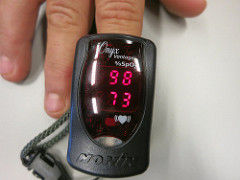
Anxiety
Listen To Your Heart
How Interoception Shapes Emotional Experiences.
Posted September 14, 2016
Let’s start with a fun exercise: adopt a resting position such as sitting comfortably on a chair or lying on your back. Remain still for a minute or two and breathe evenly until your body is calm and you feel relaxed. Now concentrate on your heartbeat. Without manually checking, try and feel your heart pounding inside your chest. Are you able to sense the internal signal?
Some people are better than others at this task, and if you are able to perceive your heartbeat well, chances are you have high interoceptive accuracy. In this article, I will outline how interoceptive accuracy shapes emotional experiences, how it goes wrong in autism and alexithymia, and how it might contribute to emotional intelligence, empathy and stress resilience.
Interoceptive sensitivity is generally known as the ability to feel the internal signals from our body such as heart rate, breathing, and gastrointestinal functions.

Sarah Garfinkel and colleagues (Garfinkel et al., 2015) recently described a number of methods to measure people’s interoceptive skills in the science lab. One measure is the heartbeat counting task (Schandry, 1981). Similar to the above exercise, people are asked to silently count their heartbeat for a variable duration of 30 seconds to 1 minute. Meanwhile, a pulse oximeter attached to their index finger tracks the individual’s actual heartbeat. The greater the overlap between people’s perceived and actual heartbeats, the better their interoceptive accuracy.
A second measure of interoception is the heartbeat detection task (Katkin et al., 1983). Here, people receive auditory tones that are triggered by their heartbeats and played either on the heartbeat or slightly time shifted (~ 500ms). The participant’s task is to judge when the tones are synchronous with their heartbeat. Again, higher accuracy in this task indicates better interoceptive accuracy.
How does interoceptive accuracy shape our emotions?
Studies have shown that those who are better able to detect their internal bodily signals (i.e. who have higher interoceptive accuracy) tend to be more emotional. For example, one study (Wiens et al., 2000) used emotionally arousing film clips that triggered fear, anger or amusement and asked participants to rate how intense the films made them feel. Those who performed well on the heartbeat detection task rated the emotional films as more intense than poor heartbeat detectors. The argument is that people who are more sensitive to their internal bodily arousal states experience emotions with greater intensity than those who are less sensitive to their bodily signals.
Other studies have shown a link between interoception and anxiety: Since people with good interoception tend to be more sensitive to their feelings, they often score higher on symptoms of anxiety (Pollatos et al., 2007; Dunn et al., 2010).
On the other hand, in conditions where emotional experiences are blunted (such as in alexithymia or autism), interoception is impaired. People with alexithymia, for example, are characterised by having difficulties describing and identifying their own emotions. Unsurprisingly, these individuals do worse on the heartbeat counting task, indicating that poorer interoceptive skills are related to greater difficulties in emotional processing (Herbert et al., 2011).
Similarly, people with autism are known for their problems in regulating emotions, recognising emotions in others, as well as experiencing increased levels of anxiety. Recently, Sarah Garfinkel and colleagues (Garfinkel et al., 2016) demonstrated that autistic individuals perform poorly on the heartbeat counting task when compared against a healthy control sample. Interestingly however, when the participants were asked to subjectively rate their interoceptive skills on a questionnaire, people with autism believed themselves to be better than the controls. In other words, there was a mismatch between their actual task performance (objective measure of interoception) and their subjective experiences of interoception.
Dr. Garfinkel explains that “The mismatch between objective interoceptive performance, such as heartbeat counting accuracy, and the subjective experience of internal bodily signals is what might engender anxiety in individuals with autism”. Indeed, she found that those autistic individuals who showed the greatest mismatch between objective and subjective interoceptive sensitivity scored higher on anxiety and lower on emotional sensitivity.
Brain representations of interoception and emotional processing
Work by Hugo Critchley and colleagues (Critchley et al., 2004) has shown that levels of interoceptive sensitivity can be traced in the brain, in an area called the insular cortex. Participants were given the heartbeat detection task while lying in an MRI scanner. Those who performed well on the task not only showed greater activation, but also had larger grey matter volume in the insular cortex.
Going back to emotions, Critchley’s study further found that people who scored higher on an anxiety questionnaire had more insular cortex activation while performing the heartbeat detection task.
The insular cortex has since become known as a brain centre involved in evaluating our internal bodily sensations, which then gives rise to emotional experiences (Terasawa et al., 2013). Consequently, damage to the insular cortex can result in emotional processing deficits that resemble those of alexithymia (Hogeveen et al., 2016).

What are the positive effects of interoceptive accuracy?
So far, we have seen that people with heightened interoceptive accuracy tend to experience emotions stronger than those with poorer interoceptive accuracy, which is often associated with symptoms of anxiety. However, being in tune with our emotions also has a number of positive effects.
Tamara Schneider and colleagues (Schneider et al., 2005) showed that people who did well in the heartbeat detection task scored higher on emotional intelligence (using the Mayer–Salovey–Caruso Emotional Intelligence Test). Specifically, higher interoceptive accuracy correlated with the ability to better understand emotions, and to use emotions wisely in order to facilitate task performance.
Emotional management, another factor of emotional intelligence, correlated negatively with heartbeat detection, suggesting that people who manage their own and other people’s emotions well are less able to sense internal bodily signals. A possible explanation for this finding is that emotional management involves keeping one’s emotional arousal in check. It follows that, if emotional managers chronically reduce their arousal levels, it might be increasingly more difficult to detect their internal bodily signals. In this sense, poorer interoceptive accuracy can be interpreted as a positive sign of emotional calming.
Another positive trait related to good interoceptive skills is empathy. Work by Vivien Ainley and colleagues (Ainley et al., 2014) showed that people who perform well on the heartbeat counting task are quick to mimic the hand movements of another person shown on a computer screen. Imitation and mimicry in social contexts reflects the ability to relate to another person and is a sign of higher levels of empathy.
Finally, good interoceptive skills appear to be related to higher stress resilience. In a recent study by Lori Haase and colleagues (Haase et al., 2016), participants who subjectively rated themselves as less resilient were found to score poorer on a questionnaire measuring interoception. Resilience was then tested objectively: Participants wore a breathing mask in an MRI scanner and breathing load was intermittently restricted during the experiment. Noticing the changes in breathing regulations is itself an interoceptive exercise and can be greatly stress-provoking for those most sensitive to the breathing restrictions.
It turned out that participants scoring poor on interoception and resilience showed greatest activity in the insular cortex (the area involved in interoception and emotional processing) when breathing was restricted, while those scoring high on interoception and resilience hardly showed any change. This suggests that people with good interoceptive skills were more resilient in coping with the stress-inducing exercise.
Conclusion
Interoceptive accuracy, the ability to listen to our internal bodily signals, is a skill that we often dismiss in our everyday lives. And yet, it has vast implications for the way we feel and regulate our emotions. Interoception has a neural basis – the insular cortex. Interoceptive accuracy predicts activity in the insular cortex, and the activation differences relate to different levels of anxiety, alexithymia as well as emotional resilience. Although interoceptive people tend to be more sensitive to their feelings (more emotional), they might benefit from higher emotional intelligence, greater empathy and better stress resilience.
References
Ainley V, Brass M, Tsakiris M (2014) Heartfelt imitation: High interoceptive awareness is linked to greater automatic imitation. Neuropsychologia 60:21-28.
Critchley HD, Wiens S, Rotshtein P, Ohman A, Dolan RJ (2004) Neural systems supporting interoceptive awareness. Nat Neurosci 7:189-195.
Dunn BD, Stefanovitch I, Evans D, Oliver C, Hawkins A, Dalgleish T (2010) Can you feel the beat? Interoceptive awareness is an interactive function of anxiety- and depression-specific symptom dimensions. Behav Res Ther 48:1133-1138.
Garfinkel SN, Seth AK, Barrett AB, Suzuki K, Critchley HD (2015) Knowing your own heart: Distinguishing interoceptive accuracy from interoceptive awareness. Biol Psychol 104:65-74.
Garfinkel SN, Tiley C, O'Keeffe S, Harrison NA, Seth AK, Critchley HD (2016) Discrepancies between dimensions of interoception in autism: Implications for emotion and anxiety. Biol Psychol 114:117-126.
Haase L, Stewart JL, Youssef B, May AC, Isakovic S, Simmons AN, Johnson DC, Potterat EG, Paulus MP (2016) When the brain does not adequately feel the body: Links between low resilience and interoception. Biol Psychol 113:37 - 45.
Herbert BM, Herbert C, Pollatos O (2011) On the Relationship Between Interoceptive Awareness and Alexithymia: Is Interoceptive Awareness Related to Emotional Awareness? J Pers 79:1149-1175.
Hogeveen J, Bird G, Chau A, Krueger E, Grafman J (2016) Acquired alexithymia following damage to the anterior insula. Neuropsychologia 82:142-148.
Katkin ES, Reed SD, Deroo C (1983) A Methodological Analysis of 3 Techniques for the Assessment of Individual-Differences in Heartbeat Detection. Psychophysiology 20:452-452.
Pollatos O, Traut-Mattausch E, Schroeder H, Schandry R (2007) Interoceptive awareness mediates the relationship between anxiety and the intensity of unpleasant feelings. J Anxiety Disord 21:931-943.
Schandry R (1981) Heart Beat Perception and Emotional Experience. Psychophysiology 18:483-488.
Schneider TR, Lyons JB, Williams M (2005) Emotional intelligence and autonomic self-perception: Emotional abilities are related to visceral acuity. Pers Indiv Differ 39:853-861.
Terasawa Y, Fukushima H, Umeda S (2013) How does interoceptive awareness interact with the subjective experience of emotion? An fMRI Study. Hum Brain Mapp 34:598-612.
Wiens S, Mezzacappa ES, Katkin ES (2000) Heartbeat detection and the experience of emotions. Cognition Emotion 14:417-427.



